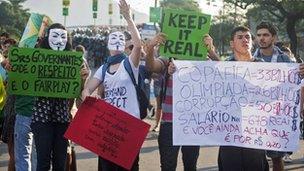Brazil Maracana stadium protest ends in clashes
- Published
The BBC's Julia Carneiro in Rio says as protesters tried to get close to the stadium, police responded with tear gas
Hundreds of protesters in Brazil have clashed with riot police near Rio de Janeiro's Maracana football stadium.
Police fired tear gas minutes before the kick-off of a Confederations Cup tie between Italy and Mexico.
Protesters were complaining about the high cost of the tournament and the 2014 World Cup, in a country still lacking in public services.
A similar protest took place before the opening match on Saturday. Further protests are planned across Brazil.
The clashes on Sunday took place outside one of the metro stations near the Maracana stadium.
An estimated 600 people joined the demonstration against an increase in bus ticket prices and the use of public funds spent on the Confederations Cup and next year's World Cup.
Riot police fired tear gas and rubber bullets to disperse the crowd.
Some fans trying to reach the stadium for the match were caught in the middle of the trouble, BBC Rio correspondent Julia Carneiro reports.
The Confederations Cup is seen as the key test event for the 2014 tournament.
Italy beat Mexico 2-1 in Sunday's Group A match, with Mario Balotelli scoring the winner in the 78th minute.
Vinegar allowed
Brazil's opening Confederations Cup match in the capital Brasilia, on Saturday, was affected by protests that left 39 people injured.
Up to 1,000 Brazilians demonstrated outside the country's national stadium to vent their anger at the amount of money the country is spending on staging next year's World Cup.

Brazilians are unhappy about rising costs of living and the expense of World Cup stadiums
Police used tear gas and pepper spray to control protestors before the match, in which Brazil beat Japan 3-0.
There were also reports rubber bullets were used and 30 arrests were made.
Demonstrators held up posters reading: "We don't need the World Cup" and "We need money for hospitals and education".
In Sao Paulo, where protesters clashed with police on Tuesday after a demonstration against an increase in bus ticket prices, authorities have announced that people will not be arrested in future for carrying vinegar - a substance known to minimise the effects of tear gas.
The Sao Paulo authorities were accused of using excessive force in last week's demonstration. A further protest is expected in the city on Monday and officials say they intend to be better prepared.
"The important thing is drawing up a route for the demonstration. That way we can set up road blocks to prevent problems for the population," Fernando Grella, Sao Paulo's Security secretary told reporters.
- Published17 June 2013
- Attribution
- Published16 June 2013
- Attribution
- Published15 June 2013
- Attribution
- Published15 June 2013
- Attribution
- Published12 June 2013